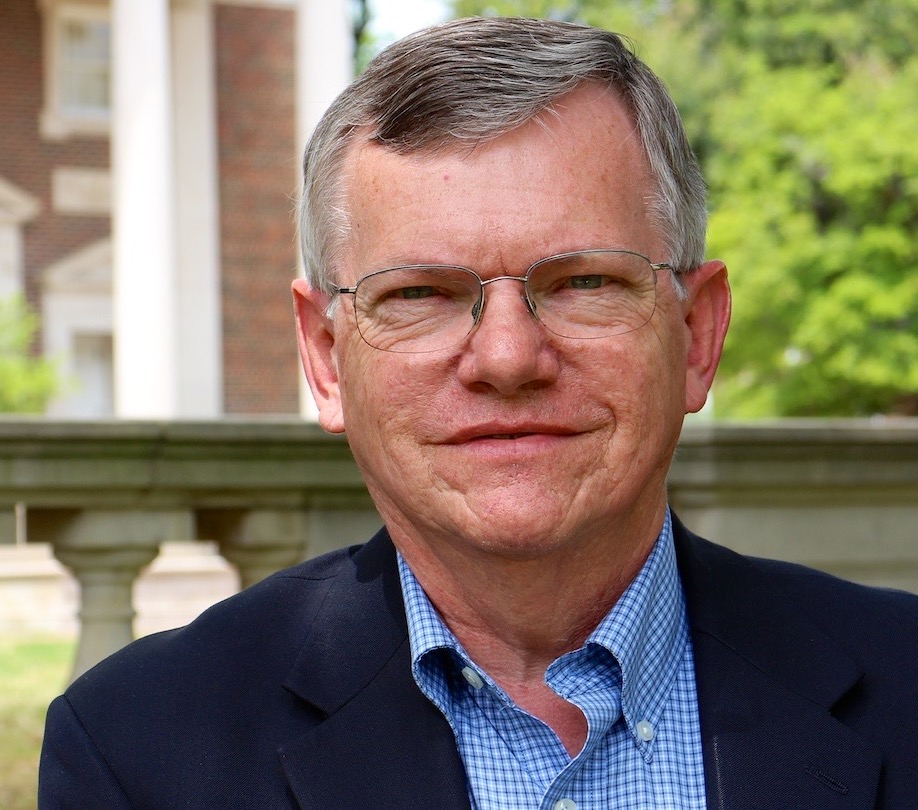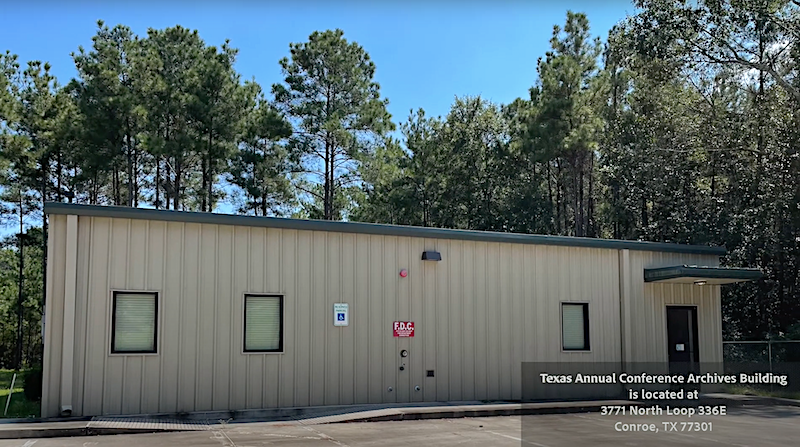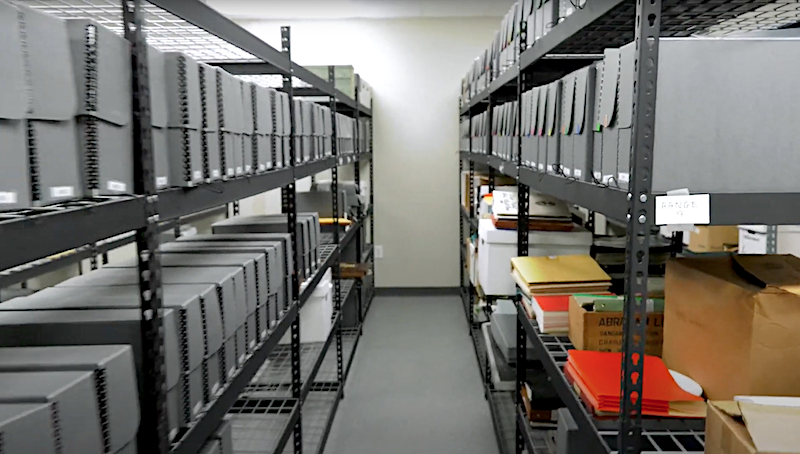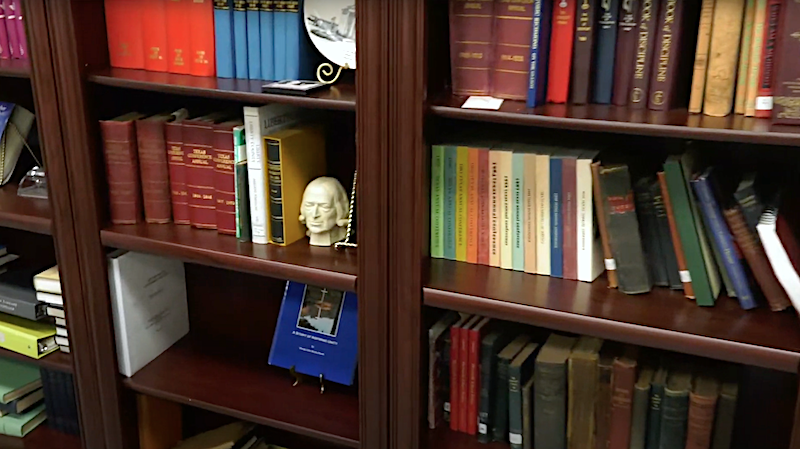
By Lindsay Peyton
The Rev. Dr. Ted A. Campbell will soon step into a new role as archivist for the Texas Annual Conference. While the position might be new to the scholar, he is no stranger to the TAC, since he was ordained an elder here in 1988. “The Texas Conference is really my home,” he said. “It’s coming home to my roots.”

While Campbell currently resides in Dallas, he was raised in Beaumont, his wife Dale hails from Houston and his daughter lives in The Woodlands, not far from where his new office will be located in the Archives Center in Conroe. Campbell also serves as the Conference representative on the General Commission on Archives and History. He will be filling the role left by the late Rev. Bill Hedges, who served as archivist until his death May 31, 2023.
After learning that Campbell planned to retire from his current position as Albert C. Outler Professor of Wesley Studies at SMU’s Perkins School of Theology, Bishop Cynthia Fierro Harvey asked Dr. Campbell if he would consider assuming the position of archivist.
“Dr. Campbell brings a wealth of knowledge to the Conference and will serve in an important capacity – collecting, preserving, and sharing materials of enduring value to the United Methodist Church,” she said. “He will not only preserve these important materials, my hope is he will also teach us about the rich history that exists in the Texas Conference,” added Harvey.
Campbell explained that each Annual Conference maintains its archives, which include church records and memorabilia. The archives serve as a resource to both genealogists exploring their family roots and historians ensconced in research.
The Texas Conference is the oldest Conference in the state, Campbell added, and its archives, which include records of predecessors, are steeped in important history.
The building in Conroe where the archives are maintained may seem nondescript from the exterior, a plain metal structure. “On the inside, however, it’s full of treasure,” Campbell said.

He described racks on racks of storage that include everything from Sunday school pins to gavels held by Bishops and District Superintendents. There are even church cornerstones in the collection. “Each item tells a story,” Campbell said. “And there are lots of materials still coming in.”
Much of the collection has already been digitized. Campbell envisions one day building a system inspired by United Methodist Archives and History Center at Drew University, which would allow the collection to be accessible online.
“Above all, I want to provide a service to the Texas Conference, so they can be proud of their history as the oldest Conference in Texas and a keeper of Methodist identity and culture,” Campbell said.
Campbell has served as a professor of church history at Southern Methodist University, Perkins School of Theology since 2006. The University where he also received his doctorate in church history. “I’m a Methodist historian,” Campbell said. “That’s my job, and that’s my life. It’s part of my sense of vocation as a Christian. I’m a teller of history and of its relevance for life today.”
He considers preserving history to be a “ministry of memory” – and believes there is a vital connection between understanding the past and moving into the future. “History informs your identity,” Campbell said. “We call ourselves back to our roots – and we ask what we stand for.”
Campbell’s interest in becoming a United Methodist minister and a historian developed simultaneously. After receiving an associate’s degree from Lon Morris College, he learned Greek at a nearby Baptist seminary. He then earned a bachelor’s degree in Latin from the University of North Texas.
At age 20, Campbell became a United Methodist preacher, while still a sophomore in college, as a student lay pastor at FUMC, Winona. He later served as associate pastor at Sunset UMC in Pasadena.
He served as a visiting lay preacher in Great Britain, while earning a bachelors and masters degree in Christian Theology at Oxford University. While in the UK, Campbell said his passion for history deepened. “You can’t do anything there and escape history,” he said. “Everything is full of history.”
In fact, while Campbell was completing his graduate program at Lincoln College, the institution celebrated its 450th anniversary. John Wesley was a fellow of Lincoln from 1726 until 1751.
Campbell left Britain wanting to know more about the history of Texas and the U.S. “The more I studied, the more I was interested in my native region,” he said. Campbell is currently working on a book exploring the history of Southeast Texas.
In addition to Perkins, Campbell has served as professor at Duke Divinity School, Wesley Theological Seminary, Claremont School of Theology, as well as a lecturer at the Methodist Theological School in Ohio. He was president of Garrett-Evangelical Theological Seminary from 2001 through 2005.

Campbell has authored a number of texts, including John Wesley and Christian Antiquity, The Religion of the Heart, Christian Confessions, Methodist Doctrine, Christian Mysteries, The Gospel in Christian Traditions and Wesleyan Beliefs: Formal and Popular Expressions of the Core Beliefs of Wesleyan Communities.
Campbell also co-edited Charles Wesley: Life, Literature and Legacy with Kenneth Newport. In 2015, he published an edition of the letters of John Wesley between 1756 and 1765, as well as a work entitled, The Sky is Falling, the Church is Dying, and Other False Alarms.
Campbell was co-recipient of the 2016 Timothy L. Smith-Mildred Bangs Wynkoop Book Award of the Wesleyan Theological Society for his editing of Volume 27: of the Letters III (1756-1765), part of the Wesley Works of Editorial Project. He received the 2016 Distinguished Service Award of the UMC’s General Commission on Archives and History.
His book Encoding Methodism: Telling and Retelling Narratives of Wesleyan Origins won the 2018 Saddlebag Award from the United Methodist Historical Society for the best new book on Methodist history.
Campbell has served as trustee for the International Foundation for Ewha Womans University, president of the Charles Wesley Society and delegate to the Faith and Order Commission of the National Council of Churches in the U.S. In 2018, he was also elected a Fellow of the Royal Historical Society of the U.K.
He is eager to assume the role of archivist. “That’s what I want to do – to carry out this ministry of teaching and connecting people to their roots,” he said.
